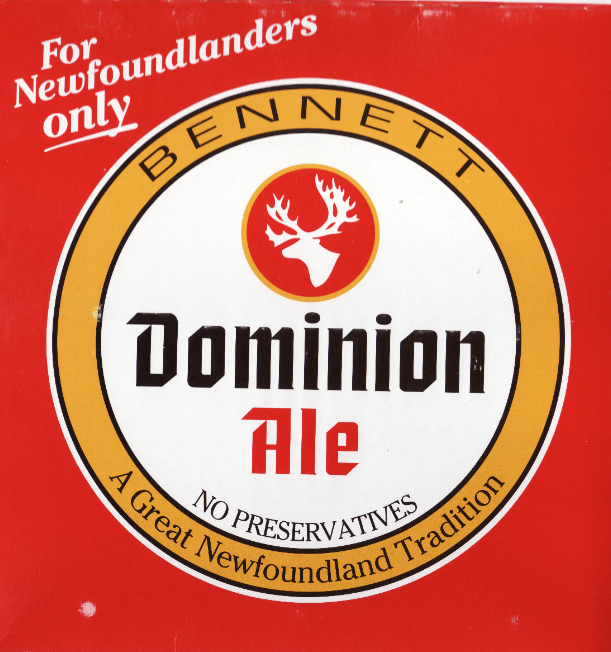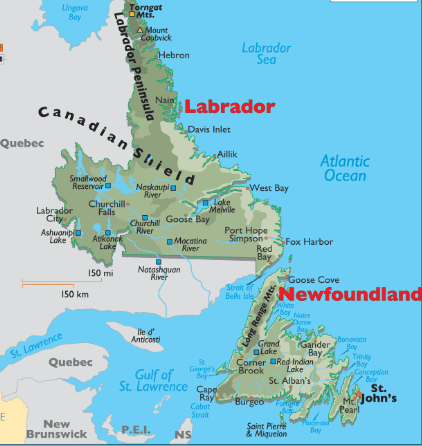Years later, we still get asked this question all the time. The answer is actually more complicated than you think. The history of Newfoundland is pretty rich, and as far as Canadian provinces go, it’s the most unique.
Is it called “Newfoundland” or “Newfoundland and Labrador”?
Newfoundland is officially known as “Newfoundland and Labrador” although most people refer to it as just plain Newfoundland (don’t say this to anyone from Labrador). If you’re watching a government ad or visiting the department of fisheries and oceans website to find out the Newfoundland recreational cod fishing dates your see the province officially referred to as Newfoundland and Labrador.
The island portion of the province is what’s technically called Newfoundland and the part that’s attached to mainland Canada is what people call Labrador. Although right now Newfoundland is part of Canada, it wasn’t always like this. Newfoundland and Labrador is the newest Canadian province and the last one to join the confederation of Canada.
Handy Dandy Links: Becoming a Province (Heritage NL)
Newfoundland used to its own country (technically referred to as a Dominion)
Most people don’t realize Newfoundland used to essentially be its own country. It was what’s known as a Dominion which basically functioned the same way as an independent country up until 1934 when a British appointed commission started to rule it.
It wasn’t until March 31, 1949, when after one of the closest votes in Canadian politics, Newfoundland and Labrador officially joined Canada. The vote was very close, with only 52 percent of the people supporting joining Canada. Many wanted to stay independent, and still to this day, it’s a hot topic of discussion among locals. What if Newfoundland had remained independent? Would they have been able to control their fishery better? Did Newfoundlanders give up their freedoms and rights? Newfoundland and Labrador has a strong nationalist history. Today you can still find people that want to separate from Canada but the overwhelming majority embraces being Canadian.

Although quite controversial, this joining of peoples is not without it’s conspiracy theories. But that’s another post for another day.
What Would Have Happened if Newfoundland Didn’t Join Confederation?
So what would life be like in Newfoundland if the vote to join Canada had gone the other way? While nobody knows for sure, the history of Iceland may hold some clues. A few years before Newfoundland officially joined Canada, Iceland held a referendum to separate from Denmark.
This time the vote that took place on May 24, 1944, went the other way and just a few weeks later, on June 17, 1944, Iceland became its own country. Most Icelanders consider this to be a big win for the resource-rich country. It was a game changer for Iceland, which, like Newfoundland, has one of the richest fishing grounds on the planet.
When Newfoundland joined confederation, they essentially lost control of their own fishery. The reverse, however, happened in Iceland when they separated from Denmark. When Iceland became its own country, they became free to manage their fishery as they pleased. Some Newfoundlanders argue the decline in the Newfoundland fishery, particularly with cod and off-shore fishing, started as soon as Newfoundland joined Canada, when the power over the fishery shifted from the dominion of Newfoundland to the Canadian government and federal ministers in Ottawa.
The fishery stopped being managed by the locals who knew and understood it and decisions started to be made by people who knew little about the Newfoundland fishery. The lack of local control was one of the driving factors behind Iceland separating from Denmark around the same time Newfoundland became part of Canada, and the contrast between these two Atlantic fishing nations is worth exploring.
Iceland Fishery Compared to Newfoundland Fishery
So what does Iceland’s fishery look like today? Iceland has one of the largest fisheries in the world. They’re famous for producing some of the best fish in the world and fetch top dollar for their product.
When Canada took over the Newfoundland fishery it started to focus on bulk export of “cod-blocks”, essentially low-quality commercial frozen bricks of fish to be sold at low prices to manufactures of fish sticks and commercial feed. Alternatively, in Iceland, a move was made to only export high-quality whole fish to international markets that demand the best of the best.
While Canada kept the economic development strategies in Newfoundland focused on fishing and general resource extraction, Iceland switched gears, focusing on the diversification of their economy. Now, Iceland has a healthy well-managed fishery, but that’s no longer their main revenue producer. In Iceland today, tourism along with alternative energy such as hydro and geothermal power share the stage. Iceland’s exports near 7 billion yearly and their country ranks high on the OECD better life index.
Does Newfoundland Want to Separate from Canada?
Most residents of Newfoundland and Labrador are proud Canadians. The province is fully part of Canada with all the rights, privilege, and responsibilities of any Canadian province. For many, looking back at the collapse of the Newfoundland Cod fishery in 1992 when Newfoundland’s North Atlantic cod biomass dangerously dipped to just 1% of pre-confederation levels, they can’t help but wonder what things would have been like if Newfoundland had been able to retain control over their fishery.
That day on July 2, 1992, when the Federal Department of Fisheries and Oceans Minister John Crosbie announced a moratorium on Newfoundland cod fishing due to the mismanagement of the resource, it changed everything.
The North Atlantic Cod Moratorium is still etched in the minds of Newfoundlanders who lost their livelihood and those who make their living on the ocean now. The decision, which arguably had to happen due to 50 years of poor fisheries management on the part of the Canadian federal government, shaped the lives of coastal communities throughout this special Atlantic Canadian province.
When Was the First Ferry to Newfoundland?
Ferries to Newfoundland have been operating for over one hundred years. The current company, Marine Atlantic, just celebrated over 120 years of service. June 30, 1898 was when the first ferry officially crossed between Port Aux Basques and North Sydney. It wasn’t Marine Atlantic, however, that operated this vessel. It was owned by the Reid Newfoundland Railway Company.
Today if you’re wondering how to take the ferry to Newfoundland you will be pleased to hear there are several ferries operating multiple sailings daily complete with vehicle decks, movie theatres, restaurant, and sleeping quarters.
In 2024 the new newfoundland ferry named the Ala’suinu complete with updated comforts, lower ecological impacts, and smarter layouts, and even onboard marine biologists and wildlife interpreters willing to chat with anyone on the nature and wildlife viewing deck, making you feel like you’re on a cruise instead of a passenger ferry.
What Is the Economy Like in Newfoundland Like Today?
Today Newfoundland’s economy is more balanced. Over 500,000 tourists visit Newfoundland and Labrador each year and the tourism industry is thriving. Fishing, forestry, mining, and hydroelectric development also play a major part.
The air and water in Newfoundland is some of the cleanest on the planet, and the standard of living in the province is high. The fishery is focused on producing high-quality fish and marine product such as hand line caught cod, lobster, and snow crab that’s exported to national and international markets.
If you’ve tried fish from Newfoundland, you already know how great it is, with some of the best fish and fish products in the world coming from Newfoundland and Labrador. Newfoundland has regained more control over their own fishery and is reaping the rewards, now doing many of the things Iceland did when they left Denmark.
How Do You Feel About Newfoundland Being Its Own Country ?
So what what you have done? Were you or someone you know affected by the Newfoundland Cod Moratorium? If you were around during the vote to join Canada in 1942 would you have voted to join confederation or would you have preferred to see Newfoundland be its own country? Post your opinion in the comments on how you feel about Newfoundland being its own country.






9 Responses
Interesting post! I had no idea Newfoundland was once its own country. Learned something new today, thanks!
Independence is the only solution. Canada has destroyed all the resources here. The cod fishery was given to the Europeans in trade for the wheat of Saskatchewan. This province was done bad by everyone ruling it. A dominion again it will be.
I was with a tour group to Newfoundland Labrador five years ago. It was one the most fulfilling trips I’ve made. Our guide, a native Newfoundlander had fished with dad in earlier days. Considering his knowledge of the island and the crash of the fishing industry, I’d vote to stay independent of Canada.
I am a us citizen who did not know the history, I vote for independence!/
I would have voted to stay independent. Our own country
Me too, have you read ‘Don’t Tell the Newfoundlanders”? (https://www.chapters.indigo.ca/en-ca/books/dont-tell-the-newfoundlanders-the/9780307401342-item.html). It’ll blow your mind!
I have that book. It’s a sad story, and so many Newfoundlanders That couldn’t even read or write, marked their X to join Canada. Newfoundland was sold out by the Premier!
GDP per capita is about the same in both places. Per-capita debt is also about equivalent. Given the state of financial management throughout pre-confederation Newfoundland history I’m not so sure they would have managed the fishery any better, the technological changes were the driving force behind the devastation. So my vote goes for Confederation, the freedom to travel and work all across Canada has been a boon to the livelihood of this place, and the stability which has come from being a small part of a greater whole has diversified risks/downturns to keep our economy overall stable.
I would have voted to stay my own country, and NOT connected to Canada. It is a natural movement of “Governments” to take full control over people and then control their lives without being “on the ground” to understand what really needs to be done. “They” screw it up every time! Why wouldn’t you want the people who live there, work there, fish there, to control their own destiny. They know what to do.